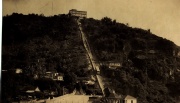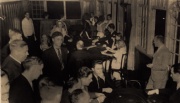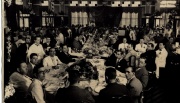

"Ladies and Gentlemen, place your bets for the last roulette game in Brazil!" ... In a solemn tone, trying to hold tears from his eyes, José Caribé da Rocha, director of the Copacabana Palace casino in Rio de Janeiro, announced, at 11:00 pm on April 30, 1946, the last roulette game in Brazilian casinos, ending a period of glamor, stories and luxury. After the announcement, the crying resounded, expressing in his face the same feeling of thousands of people and more than 40 thousand workers from the 70 or so casinos that existed in Brazil at that time. A few minutes later, 31 BLACK ....
Rio de Janeiro, Sao Paulo and Minas Gerais were the three states considered capitals of Brazilian casinos, at a time when the live musical shows in the great halls of Copacabana Palace, Quitandinha, Atlantic, Urca, Parque Balneário Hotel and Grande Hotel de Araxá were a reference both to national artists and to world-class stars on the world stage.
Casinos in Brazil were closed by the
decree-law 9215, of April 30, 1946, by the president Eurico Gaspar Dutra. The
president was influenced by his wife, Mrs. Carmela (known as Mrs. Santinha), an
extremely religious and anti-gambling woman, and Justice Minister Carlos Luz,
who wanted to be governor of Minas Gerais and fought casinos on behalf of "Traditional
Minas family". He closed the casinos ... but he lost the election!

External
image of the Morro, funicular system, and the old casino mansion (1930)
On that fateful day for the gaming sector in the country, the president met
with his ministers, secretaries of state and the head of the Federal Department
of Public Security to discuss two sensitive issues: the closure of casinos and left
communists hunt for later. By irony of fate, both of them went into hiding and
suffered for years. Fortunately the communists have gained their place in the
sun ... the casinos, not yet.
The repercussion of casino closures was immediate, and most of the newspapers published that afternoon headlines about the end of the casinos. Highlighting the "Resistance" of May 5, defending the thousands of jobs at stake: "Hard Hit in the Artistic Future of the Country!"; "Consistent with its directives, Resistance begins a movement to support the demands of all those who, by virtue of the decree-law that extinguished gaming, found themselves in a situation of unexpected maladjustment in their laborious activity..."
As we can see, even in the 1940s the strength of the sector in job creation was substantial and the social concern with the unemployed was present in the press, although in a very timid manner, since Brazil was leaving behind Dictatorship of the Estado Novo of Getúlio Vargas and some of the most important newspapers of the time supported Dutra’s government.
From day to night
But ending an activity authorized till then by the public power in the way it was done, rather than disrespect, was extremely truculent. Instead of setting a deadline for the end of casinos, the decree-law came into force on the date of its publication, catching by surprise entrepreneurs, employees and artists who had presentation contracts in casinos.
We can talk even in treason
of the government, since during the electoral campaign, the opponent of Dutra,
Brigadier Eduardo Gomes, defended the end of the casinos strongly. Due to this
position, several entrepreneurs of the sector invested in the Dutra candidacy.
He assumed in January and three months later killed the activity. Another
example of the impact of a measure like this was the Cassino Lambari, in Minas
Gerais, inaugurated one day before the prohibition of the activity. Has anyone
compensated investors?

Success and luxury
In the golden age of gaming in Brazil, the most charming,
luxurious and incredible casino was the one of the Copacabana Palace, where the
Brazilian society met to play, dance, dine and watch great shows (including
international ones). There was also the sensational and well-attended Casino
Atlântico, at the end of Avenida Atlântica, in Copacabana, with great national
and international shows. But when it comes to casino in Brazil, the first name
that comes to mind is the Casino of Urca, for its beauty, luxury and glamor, a
stage that has launched many famous artists of the country, owned by miner
Joaquim Rolla, who also built another casino that stayed in the history of gaming
lovers in wonderful venues, the Hotel Quitandinha in Petrópolis.
Sao Paulo also had its glamorous casinos, especially Parque Balneário Hotel, in
Santos, the landmark of finesse and the Sao Paulo jet set. There was also the
Casino Porchat Club, Casino Monte Serrat (which received bankers, judges,
personalities from Brazilian high society at the time and many influential
politicians, such as Governor Júlio Prestes, Dino Bueno), Miramar and
Atlântico, all in Santos, and the Grande Hotel, in Guarujá. In the interior of
Sao Paulo, other beautiful venues were located in Serra Negra, Campos do Jordão
and Aguas de São Pedro.

In Minas Gerais was inaugurated in 1941 by Benedito Valadares and Israel
Pinheiro the Great Hotel of Araxá, a reference in the state. Besides it, the
Pampulha Casino in Belo Horizonte, the famous Quisisana and Palace in Poços de
Caldas, and Brazil in Sao Lourenço (which had 8 casinos and 40 hotels around),
the most luxurious of the country and stage of renowned artists of the time,
such as Luís Gonzaga (King of Baião) and Francisco Alves (King of the Voice). At Boa Viagem Beach, in Recife, it was the American Casino, installed to meet
the soldiers of the United States based in Brazil at the time of World War II.
All the glamor, luxury and thousands of jobs were thrown out by Decree Law
9,215. The golden phase of the casinos came to an end and with it great
opportunities for discovering new talents, tens of thousands of jobs,
investments in the complexes and a leisure alternative for foreign tourists and
Brazilians who enjoyed gambling, not counting taxes that were collected from
the activity. Extinguishing it, President Dutra did not end the casinos, put then
in na illegality zone, and with that, he tied them to a fatal relationship:
corruption.
Currently there are two projects in the National Congress to regulate the activity
in Brazil. The come and go policy has not yet put either of them in final vote.
Either one would be an excellent opportunity for President Michel Temer to get
millions of jobs at such a difficult time for the Brazilian economy. Not
counting the taxes that the activity will provide at a time when revenues are
falling. What will legislators do? How about, Mr. President, to seek the
support that is lacking in order to bet on a country with a modern gambling legislation?
Source: GMB
Author: Gildo Mazza
Special thanks to dear friends Ciro Batelli and Magno José.